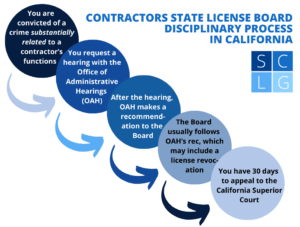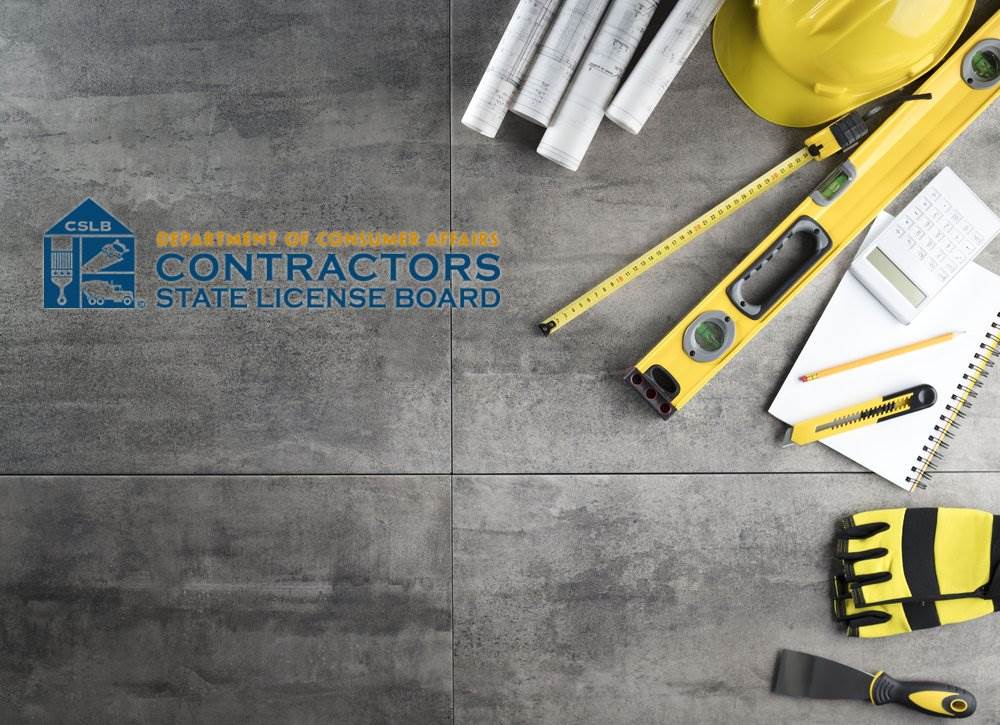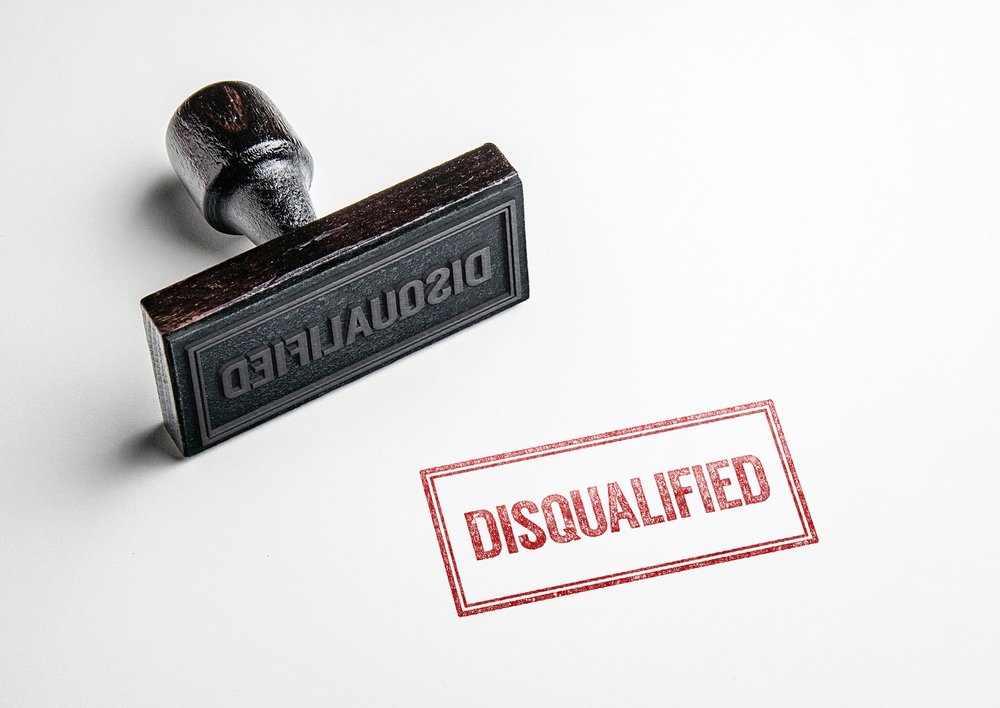Building contractors in California face revocation or suspension of their license if convicted of certain crimes “substantially related” to a contractor’s qualifications, functions, or duties. This includes crimes involving fraud, theft, or violence.
Here are five key things to know about how criminal records affect contractors licenses:
- Contractors are entitled to an administrative hearing before the Board can discipline them.
- The Board has to show “clear and convincing” evidence that the contractor is not fit to hold a license for it to be revoked.
- Applicants who committed a crime within the last 7 years may be disqualified if the crime substantially relates to contracting.
- Applicants can also be rejected for ever having been convicted of a serious offense, a financial felony related to contracting, or Tier II or III sex offenses.
- Following a license revocation, a contractor can always apply for reinstatement.

Our California criminal defense attorneys will highlight the following in this article:
- 1. Who regulates general contractors in California?
- 2. Can I acquire a contractor’s license if I have a criminal record?
- 3. What about criminal convictions older than seven years?
- 4. Is a contractor subject to discipline if convicted of a crime?
- 5. What disciplinary action can the CSLB take?
- 6. What is the WRIT process?
- 7. Can suspended contractors file for reinstatement?
- Additional resources

The California Contractors State License Board may reject applicants for having committed certain offenses.
1. Who regulates general contractors in California?
The Contractors State License Board (CSLB) regulates
- engineering contractors,
- general building contractors, and
- specialty contractors in California.
CSLB has a 15-member board, and an executive officer called the Registrar of Contractors. Housed within the California Department of Consumer Affairs, CSLB has a mission to protect building and construction industry customers and homeowners from
- unscrupulous,
- irresponsible, and
- dangerous contractors.
The agency administers the Contractors’ State License Law and related administrative regulations.1 CSLB licenses over 300,000 contractors in 43 classification categories such as concrete contractors, parking and highway improvement contractors, and contractors of swimming pools.
Under California Business & Professions Code 7028, contracting without a license is a misdemeanor crime.2
2. Can I acquire a contractor’s license if I have a criminal record?
Maybe. The CSLB may generally grant licenses to applicants with a criminal conviction within the past seven years, as long as the offense is not substantially related to the qualifications, functions, or duties of being a contractor.3
An offense is “substantially related” to contracting if it implicates a contractor’s ability to perform contracting work in a safe and responsible manner.4
Examples of offenses that may lead to the denial of a license are:
- violations of the Contractors’ State License Law,
- crimes involving dishonesty, fraud, deceit, or theft,
- crimes involving physical violence against persons,
- crimes that indicate a substantial or repeated disregard for the health, safety, or welfare of the public,5 and
- violations of California Penal Code Section 396 (taking advantage of the public during emergencies like earthquakes or fires).6
Note that applicants are not required to disclose past convictions on their license application. However, they do need to submit to a fingerprint background check, which is how the CSLB’s Criminal Background Unit will discover if they have past convictions.
What qualifies as rehabilitation
If an applicant received a substantially related conviction within seven years from the date of applying for a license, the person may still receive a license if they can present evidence of rehabilitation.7
The Registrar will consider a number of factors in determining whether a contractor or applicant has been rehabilitated from their crime, including the time that has elapsed since the conviction.8
With regards to felony convictions occurring within seven years of an application, the CSLB may consider an applicant rehabilitated so long as there has not been any additional criminal activity.9
With regards to substantially related misdemeanor convictions, an applicant may be considered rehabilitated so long as there has not been any additional criminal activity within 3 years from:
- the time of release from incarceration, or
- completion of probation (if no incarceration was imposed).10
Additional rehabilitation factors
CSLB will also consider the following in determining whether or not an applicant has been rehabilitated
- the nature and severity of the crime,
- evidence of any subsequent crime,
- compliance with parole, probation, or restitution terms,
- consistent work history subsequent to release from incarceration or completion of probation,
- letters of reference,
- evidence of expungement proceedings,
- substance abuse counseling, and
- anger management counseling.11
Probationary licenses
In some cases, the CSLB grants applicants with criminal histories a probationary license (pursuant to Business and Professions Code section 7073(e)).
This way the applicant can work as a contractor during the probation period (usually two to four years) while following various probationary terms. Then it can convert to a regular license after the probation period ends.
Appealing a license denial
If an applicant’s contractor’s license application is denied, they have 60 days to request a hearing with the CSLB to contest the denial. They are advised to retain an attorney to speak on their behalf and present evidence of their rehabilitation.
(Learn more about these hearings at California Government Code 115oo et. seq.)
3. What about criminal convictions older than seven years?
The CSLB generally does not deny licenses to applicants with a conviction that is older than seven years. This is provided that the applicant successfully finished all the sentencing terms (such as paying fines or doing community service).
However, there are exceptions to this rule. The CSLB may still deny licenses to aspiring contractors if they have been convicted at any time for either of the following serious offenses:
- a crime that mandates Tier II or Tier III sex offender registration,
- a felony financial crime that is directly and adversely related to the fiduciary qualifications, functions, or duties of contracting, or
- a serious felony, as defined in Section 1192.7 of the California Penal Code.
Examples of serious felonies under PC 1192.7 include:
- murder,
- rape,
- grand theft,
- kidnapping,
- mayhem,
- forced sodomy, and
- assault with a deadly weapon.12

The CSLB may begin the disciplinary process against a licensed contractor if they are convicted of a crime that is “substantially related” to the qualifications, functions, or duties of a contractor.
4. Is a contractor subject to discipline if convicted of a crime?
Under California’s contractor’s license laws, the CSLB may begin the disciplinary process against a licensed contractor if they are convicted of a crime.
This is true provided that the crime convicted of is “substantially related” to the qualifications, functions, or duties of a contractor. The term “substantially related” has the same definition as set forth in Section 2 above.
“Convictions” include felony and misdemeanor convictions secured through:
- guilty pleas and verdicts,
- no contest pleas, and
- even expunged criminal records.
When disciplinary proceedings begin
The Registrar can act with respect to a conviction when:
- the time for appeal has passed,
- the judgment of conviction has been affirmed on appeal, or
- an order granting probation is made suspending imposition of a sentence.13
Note that entering a guilty plea in pursuit of a deferred entry of judgment should not result in disciplinary proceedings or disqualification since the plea will be taken back as long as the defendant completes all the court orders. Expunged convictions also should not have any negative effects (in most cases).
5. What disciplinary action can the CSLB take?
If a licensed contractor is convicted of a crime that is substantially related to contracting, the result is usually either:
- license suspension, or
- license revocation.
Note that the convicted contractor may have an administrative hearing before the CSLB can take any form of disciplinary action. The hearing is conducted before an administrative law judge (ALJ) and is held at the Office of Administrative Hearings (OAH).
The administrative hearing
Under California law, an OAH administrative hearing is like a mini court trial, with:
- opening and closing statements,
- the presentation of evidence, and
- witnesses.
During the hearing, the convicted contractor can present such evidence of:
- the specific crime convicted of,
- how the crime is not substantially related to contracting, and
- rehabilitation.
A skilled defense attorney can represent a contractor at the hearing and present evidence on their behalf.
In addition, the Board at the hearing can present evidence of:
- a substantial relation between the crime convicted of, and
- a lack of rehabilitation.
The CSLB generally must prove by “clear and convincing” evidence that the contractor is not fit to have their professional license.14 If successful, then the contractor must prove that they are fit to be a contractor.15
After the hearing ends
About a month after the hearing concludes, the ALJ will make a recommendation to the CSLB about the contractor’s license. This goes by the name “proposed decision.”16
The proposed decision goes to the Registrar and normally suggests:
- no disciplinary action, or
- some form of action, typically either license suspension or revocation.
The Registrar can either:
- adopt the decision,
- modify it, or
- enter a different decision.
Normally, the Registrar adopts the ALJ’s decision.
6. What is the WRIT process?
The WRIT process under California State law is the process by which a convicted contractor can appeal the proposed decision and ultimate decision of the Registrar.
The contractor can file a Writ Petition 30 days after the Registrar makes their ultimate decision. The petition begins the appeals process.
The California Superior Court hears the appeal, which reviews all of the evidence from the administrative hearing.
The Court will affirm the Registrar’s decision if it finds that it is more likely than not that the Registrar made a decision that was reasonable. Reasonableness is based upon the evidence presented at the hearing.
7. Can suspended contractors file for reinstatement?
Yes. A contractor can file for reinstatement if the CSLB suspended or revoked their license.17
If the Board restores the contractor’s license, the contractor must post a disciplinary bond/contractor bond of at least $15,000 before resuming as a contractor.18
The disciplinary bond is in addition to other bonds required by law.
Additional resources
Refer to these professional contractors associations for more information:
- Associated General Contractors of California Chapter – A construction industry trade association representing over 1,000 general contractors, subcontractors, suppliers, and service providers in California.
- Southern California Contractors Association – A regional construction trade association representing contractors, subcontractors, suppliers, and professionals in the commercial, industrial, public works and residential construction industry in Southern California.
- The International Association of Professional Contractors – An organization that aims to support independent contracting businesses and professionals from various fields through community engagement, networking opportunities, education, and legislative advocacy.
- National Electrical Contractors Association – A US trade association that represents the business interests of electrical and systems contractors who work in varying industries including residential, commercial, industrial, institutional, critical infrastructure and more.
- American Subcontractors Association, Inc. – A national trade organization exclusively representing subcontractors, specialty contractors, suppliers, and service providers in the construction industry to improve their performance and competitiveness and strengthen the business environment in which they operate.
Legal References:
- See California Business and Professions Code Section 7000 et seq; and, California Code of Regulations Title 16, Division 8.
- California Business and Professions Code 7028.
- California Contractors State License Board, “Important Notice Regarding Convictions.”
- See same. Assembly Bill 2138.
- 16 California Code Regs 868.
- California Business and Professions Code Section 7123.5.
- California Contractors State License Board, “Important Notice Regarding Convictions.”
- See same.
- See same.
- See same.
- 16 California Code Regs 869.
- California Penal Code 1192.7 PC.
- California Business and Professions Code Section 7124.
- Ettinger v. Board of Medical Quality Assurance, 135 Cal.App.3d 853 (1982).
- California Government Code Section 11504.
- See California Government Code Section 11517.
- See 16 Cal Code Regs 870.
- California Business and Professions Code Section 7071.8.
